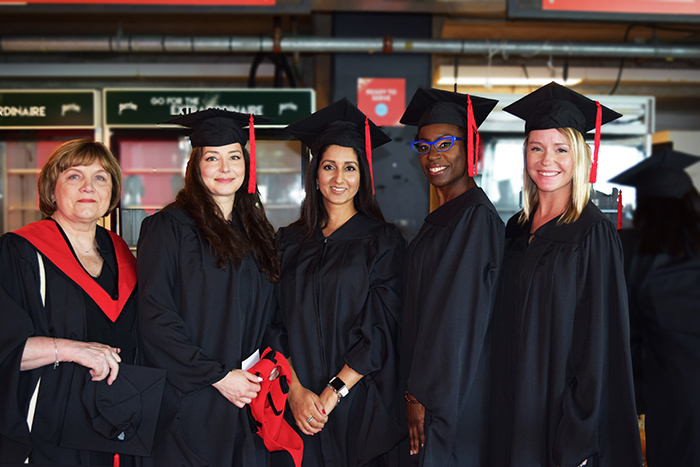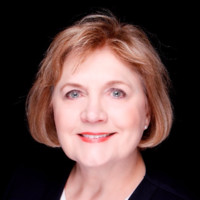

January 22, 2020
We had a chance to speak with Dr. Sandra Donnelly, who is a Clinical Nephrologist at William Osler Health System (Osler) and has been teaching at the University of Toronto Faculty of Medicine for 29 years. She serves as Regional Medical Lead and Member of the Optimal Dialysis Access Panel at the Ontario Renal Network. Here’s what she had to say about her experiences at OsgoodePD.
Congratulations on graduating from the LLM program last year June. I see here you began your LLM at one of the busiest points in your career.
Yes, when I was thinking about the LLM in Health Law, I was just starting as the Corporate Chief of Medicine at Osler. It was an administrative role and clinical obligations were very busy at the time. I wanted to begin legal studies when I was first onboarding as Chief of Medicine – but that would have been too much so I started 2 years into this role.
The Chief of Staff who I worked with at the time spent a lot of time with lawyers. He noted that OsgoodePD had a really good program in health law. That’s where I first heard of it.
Why did you ultimately choose to do you LLM at Osgoode Professional Development?
Before the LLM, I did The Osgoode Certificate in Health Law, recommended to me by Osler’s in house counsel. It gave me an understanding of the legal framework, and I was able to connect with some of the faculty there. This experience confirmed my comfort and confidence in OsgoodePD’s programs.
I wanted to expand on my experience with the Certificate. The LLM, for me, was a natural progression. Secondly, my work was in the city, so I knew I wanted to do a program nearby. I was working with so many time pressures. The LLM was flexible enough for me to accommodate those other time sensitive obligations. OsgoodePD was really good about that.
I did some of the program remotely. As much as technology allows, video conferencing really makes you feel a part of the group. However, being present in the class and speaking to the profs over coffee was also a great opportunity. My proximity to the program allowed me to attend a great part of the program in person.
OsgoodePD accommodated my time and distance pressures by providing me the option for video attendance as the on call clinical circumstances dictated.
Picture yourself speaking to someone considering graduate legal studies – having been through the program, what would you tell them about your experience? What stands out?
Definitely the class—its participants brought a diverse and rich background. Everyone had a history and a story from where they were coming. Class discussions were so rich and so poignant. OsgoodePD becomes only as good as the students it attracts to attend.
We were spread all across Canada. The students brought stories and examples that highlighted differences in the laws across provinces and that just enriched the conversation. Having a diverse classroom helped compare and contrast legal systems across jurisdictions and thereby galvanize the concepts.
The quality of the instructors and facilitators also stand out to me, and their legal wisdom. I was always amazed at how they were able to hone onto THE issue was as they developed a thought…perhaps because I am not a lawyer or perhaps because the profs were simply inspired.
In my role as Corporate Chief, I saw the laws evolving. The rise of technology, the tension around privacy, and areas such as medical assistance in dying were changing. The deeper and clearer understanding of the laws I gained from the LLM not only helped me in my role as Chief, but also as a mentor to staff members in tension with legal issues.
Here is a real life example where having a legal background came in handy.
Once there was a family with a parent who had Alzheimer’s and the patient lacked the capacity to make their own decisions. The physician’s interactions with the patient’s son had caused a great deal of pain for the family. The staff member was just trying to do the right thing and trying to accommodate the input of the son, but the physician was unaware that the son did not have power of attorney.
He had seen other physicians doing things the same way with this family regarding consent. The opportunity to mentor this physician and make all the team members aware of the legal requirements clarified the process and streamlined the decision making.
I had a firm belief that a clearer understanding of the legal framework would benefit the staff. This would make physicians more effective practitioners in how they frame the discussion with the patient or substitute decision maker. This would help them become more confident in delivering the options and make for a better professional experience.
Thereafter, I arranged to bring the Osgoode Certificate in Health Law to William Osler. It was well received at the hospital. The lawyers who taught the program also had a rich experience. While the instructors (mostly lawyers) thought the participants asked tough and relevant questions, the physician participants dismissed the compliment indicating that their questions simply addressed everyday ‘bread and butter’ issues.
This highlights my own experience after having completed the certificate and LLM. It enriched my clinical practice, enhanced my effectiveness as Chief of Medicine and how I could mentor the members of my department.
As Regional Medical Lead in the Ontario Renal Network, an administrative body that oversees the delivery of care to persons living with kidney disease, I could clearly see the issues that we had discussed in class emerge in our planning activities. That framework of ‘legal’ thinking that I developed in the program brought a lot of value to this work. In that administrative role, having that understanding of consent and privacy really galvanized my confidence in how I approached these conversations.
As a final thought in your own words, why should someone complete an LLM?
As a non-lawyer, when I first started the program, it struck me how very different lawyers asked questions and even more so, how they constructed answers. It seemed that they were rather verbose in contrast to the brisk and targeted answers of the physicians.
By the end of the LLM, I had a deeper appreciation of the legal thinking and building the argument. The importance of the legal argument in working through complex and layered issues became another valuable attribute of the LLM. While I was accustomed to thinking in the scientific method, the acquired skill of legal thinking is a great addition to your toolkit.
Wondering if the Professional LLM is right for you? Get information on course requirements, application dates, tuition and more!

Dr. Sandra Donnelly is a clinical nephrologist at William Osler Health System and associate professor of medicine at University of Toronto Faculty of Medicine.

